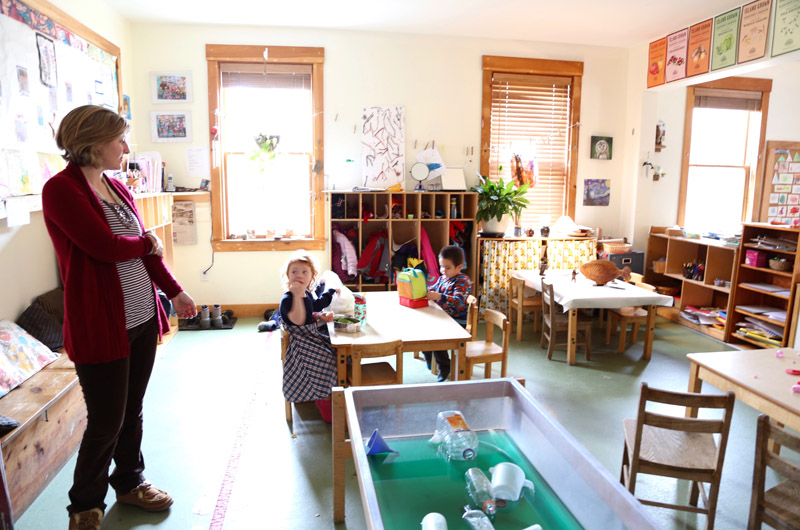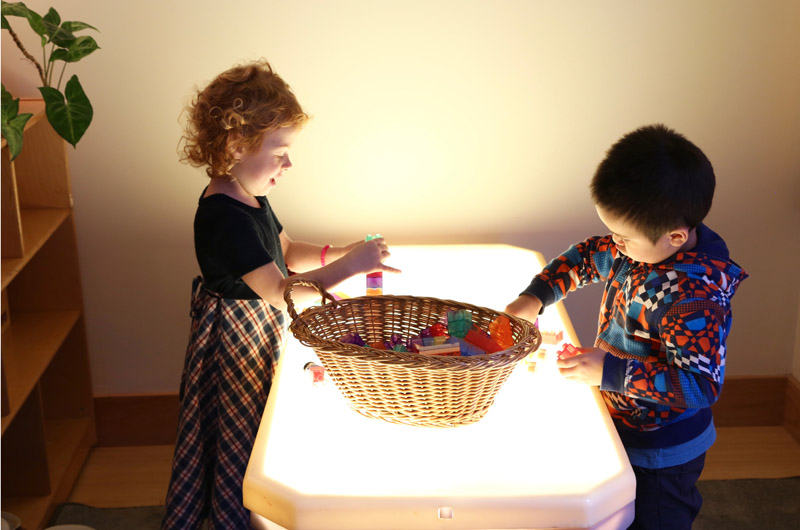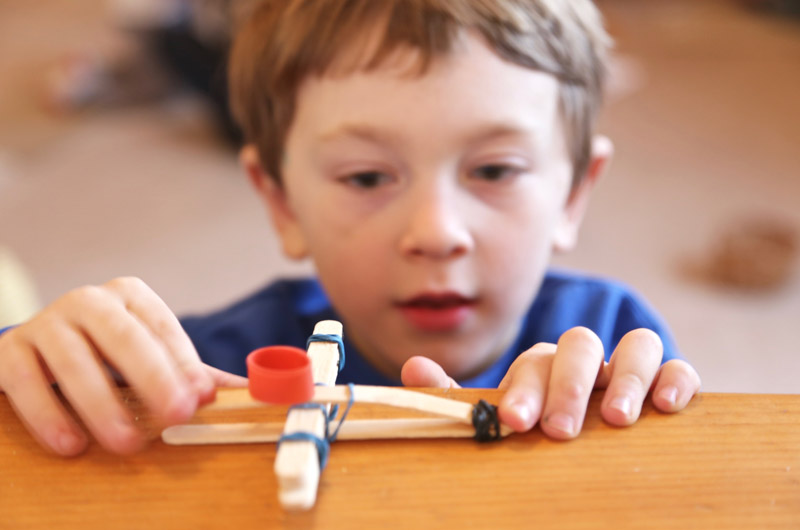It was quiet on Wednesday morning at Island Children’s School, one of the oldest preschools on Martha’s Vineyard. Children aged two to four were clustered in small groups, sharing an early snack or playing with blocks and Legos. A loft had become a temporary animal hospital, where a trio of young boys attended to a pack of stuffed animals. The scene was tranquil — not a word often used to describe a group of young children at any hour of the day — which director Yvonne Fisher attributed to the fact that they had recently come in from outdoors.
“We’re outside every morning for a half-hour, and then again for an hour before lunch,” she said on a tour of the West Tisbury school that was started by a group of Island parents in 1969. More time spent outdoors is part of a new shift in school philosophy, initiated by Ms. Fisher when she took over as director in 2014. Other cornerstones of the new approach include a strong focus on Island ecology and the environment, the use of natural materials and community field trips.
Island Children’s School is one of 10 state-licensed preschools on Martha’s Vineyard. Every one is currently at or near capacity, some with multiple classrooms of 12 to 20 students each. Most schools report long wait lists and by mid-winter are generally full for the coming fall.
Deborah Jernegan, head of school at the Vineyard Montessori School, said her two preschool classrooms typically fill up in February for the following year. “Schools with strong philosophies seem to fill up the fastest,” she said.
National studies have found that early education plays a critical role in child development by helping build lifelong skills, both social and academic. A national push two years ago for universal prekindergarten programs became a dream on the Island too among parents and education leaders. Nevertheless, free preschool for all children remains far from reality here.
But with strong demand for preschool education, more programs are being planned. At Felix Neck Wildlife Sanctuary in Edgartown, a $350,000 grant from MVYouth that was announced last week will allow the development of a nature-based preschool in a new barn that is being built for education programs. “I had a parent tell me that before she told her family she was pregnant, she was already getting the child on preschool wait lists,” Felix Neck executive director Suzan Bellincampi said in an interview this week. “There are wait lists all over the Island. There is definitely a need.”
Begun fifty years ago as a natural history camp for children, Felix Neck is perhaps uniquely poised to offer a nature-based preschool. “We have the resources here and it’s what we do,” Ms. Bellincampi said. “Forty per cent of the Island is conservation land. It’s something that this community values.”
Cristina LaRue, a Martha’s Vineyard Vision Fellow in residence at Felix Neck and a third and fourth grade teacher at the Martha’s Vineyard Public Charter School, has helped develop its expanding education program. As a new mother herself, Ms. LaRue knew she would some day want a nature-based program for her son, but found that the program she was looking for didn’t yet exist.
“Early childhood exposure to the environment is really important,” she said. “If we want kids to grow up to take care of the planet, we have to give them a chance to develop empathy for living things, and to develop their ecological literacy.”
Island preschools vary in philosophy and teaching methods.
The Montessori philosophy, developed by Italian physician and educator Maria Montessori in the early 1900s, emphasizes a child’s independence, uses specially-designed learning materials and is founded on the idea of freedom within boundaries. “Students move around the classroom as individuals, not in a group,” Ms. Jernegan said. Emphasis is placed on real-world work, like cooking and cleaning, and students are encouraged to explore while maintaining a strong sense of order.
The Plum Hill School in West Tisbury, inspired by Waldorf education, encourages daily interaction with the natural world. “A huge part of our curriculum is being outside, rain or shine,” said Lucia Dillon, co-director and lead teacher at Plum Hill. “Daily nature walks are a part of every day. Even in a snowstorm.”
Waldorf education, started by Austrian philosopher Rudolf Steiner at the turn of the century, promotes imaginative play and the holistic development of a child. “We focus on young children as will-beings,” said co-director Laura Marashlian, a former teacher at the Rudolf Steiner School in New York City. “We are modeling behavior for them, we are crafting with them, cooking, cleaning; all things that they can do with their bodies.”
Like Vineyard Montessori, Island Children’s School and others, the Plum Hill school grew from a group of like-minded parents and playgroups into a licensed preschool program. Plum Hill has enough children on its wait list to fill a second classroom, but the school’s current facility lacks the space to expand.
Meanwhile, as planning begins for the Felix Neck preschool, other part-time or alternative nature-based programs for young children have cropped up on the Island in recent years, a sign that accredited programs may be overburdened.
With four children under the age of three between them, sisters Ariana Binney and Kaila Allen-Posin, program manager for Island Grown Schools, last year started At Home in The Woods, a nature-based home-school cooperative facilitated by parents. “We couldn’t believe the response we got right away,” Ms. Binney said. The program takes as its model the so-called forest school philosophy, popular in many European countries, with the majority of each day spent exploring outdoors.
Nature-based or not, leaders at Island preschools for the most part agree that when it comes to preparing children for kindergarten, alphabet drills are a thing of the past.
Heather Quinn has been the director of Chilmark Preschool since 2010, and the school’s 20 slots have been fully enrolled each year since her arrival. After working in early education for more than two decades, Ms. Quinn has noticed a dramatic shift in the expectations of children at the preschool and kindergarten levels. “Many kindergartens today look like what first grade classrooms looked like 10 or 15 years ago,” she said, and the expectation is that preschools will adapt to prepare children accordingly.

Instead, Ms. Quinn and others believe that a play-based, child-centered approach does more to develop a child’s sense of social and emotional security, which in turn leads to a stronger relationship to learning. “We view children as competent, curious, resourceful and creative,” she said. “It is their genuine enthusiasm for learning about the world around them that drives or curriculum.”
At Island Children’s School, the curriculum is emergent, meaning that it stems from the children’s expressed interest in certain subjects. “Last year we studied space for a month and a half, because the children were so into it,” Ms. Fisher said.
With so many options and a variety of educational philosophies to choose from, Ms. Fisher advised that when selecting a preschool, parents should do their homework. “Find the right fit. Put aside your preconceived notions about what will get your kid ready for kindergarten. Look at where your child is now and what his or her needs are socially and emotionally, and make sure the school environment fits those needs.”









Comments (3)
Comments
Comment policy »